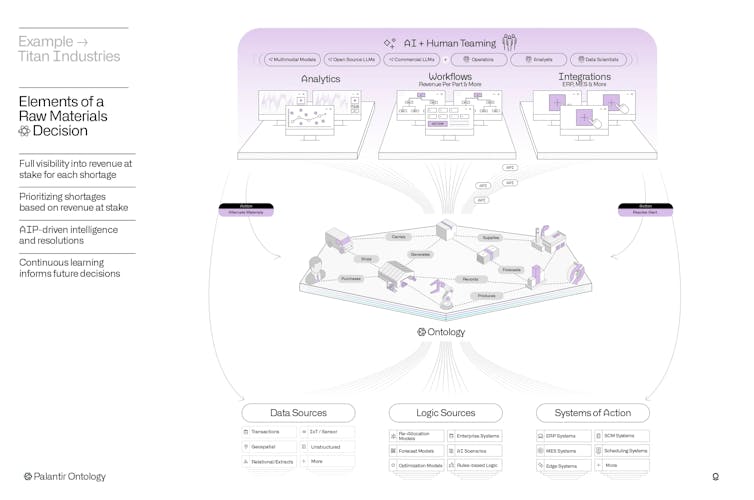What does the Australian supermarket chain Coles have in common with the CIA? As of last week, each are clients of Palantir Technologies, a US tech company “focused on creating the world’s best user experience for working with data”.
In a three-year deal, Coles plans to deploy Palantir’s tools across greater than 840 supermarkets to cut costs and “redefine how we take into consideration our workforce”.
The tech company, named after magical seeing stones from the Lord of the Rings, offers comprehensive software that collects, organises and visualises a client’s data in “one platform to rule all of them”. For an intelligence agency, Palantir’s tools might help discover a terror cell through phone calls and financial transactions; in a healthcare organisation, they may find ways to get monetary savings by shortening emergency department stays.
For Coles, the goal is to “optimise its workforce” by analysing “over 10 billion rows of information, comprising each store, team member, shift and allocation across all intervals in a day, daily”.
The announcement is linked to Coles’ plan to avoid wasting a billion dollars over the following 4 years, and follows a 2019 big data take care of Microsoft, an effort to construct robotic delivery centres, and the introduction of customer-tracking cameras and other high-tech security measures.
The Palantir process
What might this Palantir–Coles collaboration seem like in practice?
Typically, Palantir first sends out “forward-deployed engineers” to start work with an organisation’s data, which is usually messy, incomplete and fragmented. These engineers work with different branches and stakeholders to bring the info together right into a single compatible whole called “The Ontology”, which comprises all the data deemed relevant.
Then the info might be fed into Palantir’s platforms – on this case, customisable software called Foundry and the Artificial Intelligence Platform.
The platforms let clients explore the info through dense but user-friendly interfaces populated by columns and rows, boxes and contours. The Artificial Intelligence Platform also brings ChatGPT-like language models into the combination.
Users might compare earnings between branches, flag a store that seems inefficient, or discover an upcoming period of high spending based on historic patterns.
All of this probably seems banal, and even boring. It’s actually less overtly problematic than Palantir’s work with governments and law enforcement, which has been slammed for enabling data-driven deportation or racist policing, and seen the corporate described as “evil”.
However, the deal doesn’t have to be overtly malevolent to be meaningful. A technology of surveillance and control is quietly becoming infrastructure, moving from front-page news to something ticking along silently within the background. In this sense, Palantir shifts from the visible to the operational, imperceptibly but powerfully shaping the lives and livelihoods of Australian supermarket employees and shoppers.
Optimising the workforce
We can briefly sketch out three implications of the deal.
First, by inking this deal, Coles frames itself as future-forward and logistically driven. Groceries and grocery-store labour turn into more data, identical to the hedge funds, healthcare, or immigrants that other Palantir clients coordinate.
Supermarkets have been under fire over the past yr for increasing profit margins through a pandemic and cost-of-living crisis, and accused of underpaying staff.
The Palantir deal continues this extractive trajectory. Rather than paying staff more or passing savings onto customers, Coles has chosen to take a position tens of millions in technology that can “address workforce-related spend” as a part of a larger effort to chop costs by a billion dollars over the following 4 years. Food (and the labour needed to grow, pack and ship it) is transformed from a human must an optimisation problem.
A walled garden
Second, dependence. As my very own research found, Palantir clients are inclined to benefit from the all-encompassing data and latest features but in addition turn into depending on them. Data mounts up; latest servers are needed; licensing fees are high but have to be paid.
Dan Himbrechts / AAP
Much like Apple or Amazon, Palantir’s services excel at creating “vendor lock-in”, an ideal walled garden which clients find hard to go away. This pattern suggests that, over the following three years, Coles will increasingly depend upon Silicon Valley technology to know and manage its own business. An organization that sells 1 / 4 of Australia’s groceries may turn into operationally reliant on a US tech titan.
A way of seeing
Finally, vision. What Palantir sells is fundamentally a way of seeing. Its dashboards promise a God’s eye view that may stretch across a complete organisation or zoom in to granular detail to locate that “needle within the haystack” insight.
The claim is that this data-driven view is a shortcut to total knowledge, a technique to map every operation, reveal every necessary element, and discover every inefficiency.

Palantir
Yet the info inevitably excludes significant social, financial and environmental information. The sweat of staff struggling to pack at pace, the belt-tightening of consumers struggling to make ends meet, and the struggle of farmers to survive unexpected climate impacts will go untracked.
Such details never appear on the platform – and in the event that they’re not data, they don’t matter. Will Palantir’s data-driven myopia translate to how Coles views its staff and customers?
By placing Palantir at the guts of its operations, Coles quietly smuggles in several key assumptions: that food is a commodity to be optimised, that paying for labor is a risk quite than a responsibility, and that data can capture every thing of importance. At a time of increased food insecurity, Australians should strongly query whether that is the direction one in all our major grocery providers should take.
This article was originally published at theconversation.com





